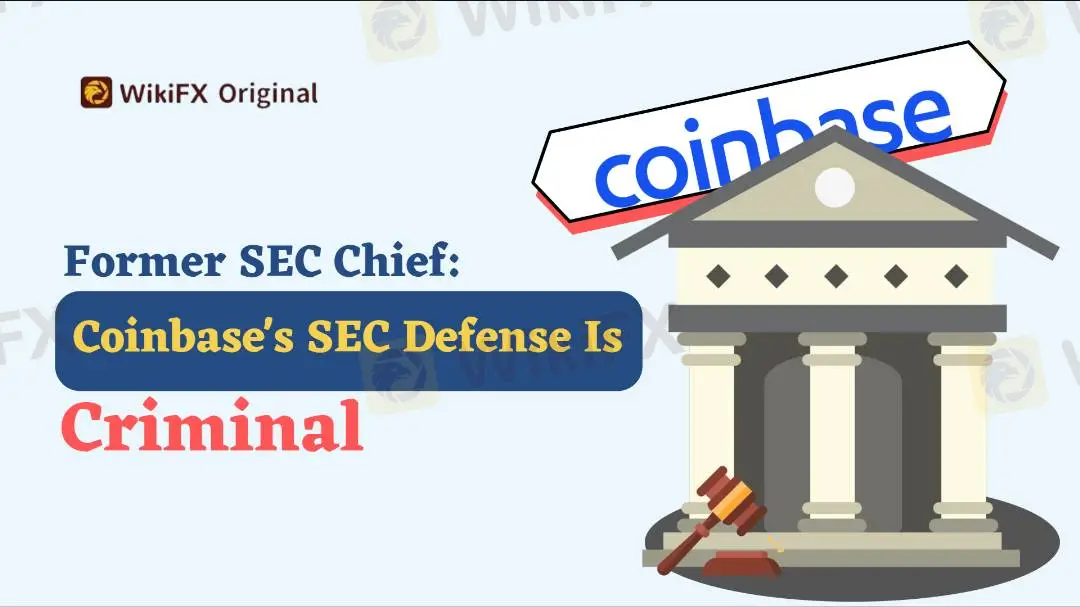简体中文
繁體中文
English
Pусский
日本語
ภาษาไทย
Tiếng Việt
Bahasa Indonesia
Español
हिन्दी
Filippiiniläinen
Français
Deutsch
Português
Türkçe
한국어
العربية
Former SEC Chief: Coinbase's SEC Defense Is Criminal
Abstract:John Reed Stark has criticized Coinbase Exchange's primary defense strategy in response to the charges brought by the SEC.

John Reed Stark, former Chief of the SEC Office of Internet Enforcement, has criticized Coinbase Global Inc's defense strategy against the markets regulator. He argues that the exchange's claim of regulatory approval during its IPO in 2021, implying the SEC's understanding of its operations, is fundamentally flawed.

John Reed emphasizes that the SEC's role in IPO filings is to review the accuracy of disclosures made by the applying company. He highlights that the SEC includes a disclaimer in every prospectus, explicitly stating that they have not approved or determined the truthfulness and completeness of the securities or the prospectus. John Reed provided an example of the disclaimer, which emphasizes that any contrary representation is a criminal offense.
According to him, the SEC's primary objective is to assist investors in making informed investment decisions based on accurate information. Therefore, Coinbase's assertion that the SEC is aware of its business is unlikely to strengthen its defense in the ongoing lawsuit.
Coinbase Has a Long Road to Trail
Coinbase, the exchange, currently faces significant legal challenges as it deals with two lawsuits from the US SEC. Firstly, the platform filed a lawsuit against the SEC, led by Gary Gensler, alleging a lack of regulatory clarity despite previous requests for guidance.
The second lawsuit, which carries greater significance, involves charges against Coinbase for facilitating the trading of unregistered crypto securities such as Cardano (ADA), Solana (SOL), Filecoin (FIL), and Polygon (MATIC), among others.
Considering the protracted legal battle between Ripple Labs and the regulatory authorities, it is expected that Coinbase will face a similarly long and challenging legal process.

Disclaimer:
The views in this article only represent the author's personal views, and do not constitute investment advice on this platform. This platform does not guarantee the accuracy, completeness and timeliness of the information in the article, and will not be liable for any loss caused by the use of or reliance on the information in the article.
Read more

Which Currency Pairs are Most Commonly Traded in India?
Currency pairs play a crucial role in forex trading. To effectively participate in the forex market, it's important to understand which currency pairs are most relevant in your country. For traders in India, knowing the actively traded currency pairs is essential.

Future of Forex in India: Growth or Global Domination?
Every Trader or Investor in India who wants to invest in the dynamic forex market must read this important article. It explores the future of the forex market in India and answers a common question: Forex market will rise or crash in India ? Checkout the article below.

Bitget Lists Caldera for Spot Trading | What Should You Know?
Bitget, a cryptocurrency exchange and Web3 company, has listed Caldera (ERA) for spot trading. Caldera is a rollup platform built on Ethereum. It is designed to allow horizontal scaling and interaction between different rollups.

Dubai Police Arrests 4 People in Connection with High and Quick Profits Online Trading Scam
Dubai Police have arrested four individuals involved in defrauding many investors via fake online trading schemes that promised high and quick returns. Check out the arrests, international connections, and more in this story.
WikiFX Broker
Latest News
Interactive Brokers Expands Forecast Contracts to Europe
CNBC's Inside India newsletter: Why an India-U.K. trade deal does not make U.S.-India agreement any easier
Fraud Alert: 5 Issues You Might Face with Binomo
OpenAI spearheads one of Europe's biggest data centers with 100,000 Nvidia chips
Silver in Correction Mode: Navigating the Precious Metal’s Pullback
Webull Pay Reviews 2025: Details Compared
Doctor Trapped by 520% Profit Promise, Loses RM8.7 Million
CVS shares pop on earnings beat and outlook, as retail pharmacy and insurance units improve
Robinhood Gains 2.3M New Accounts, Platform Assets Close to $280B
Amazon earnings primer: Why AI and tariffs are key to the second quarter
Currency Calculator


